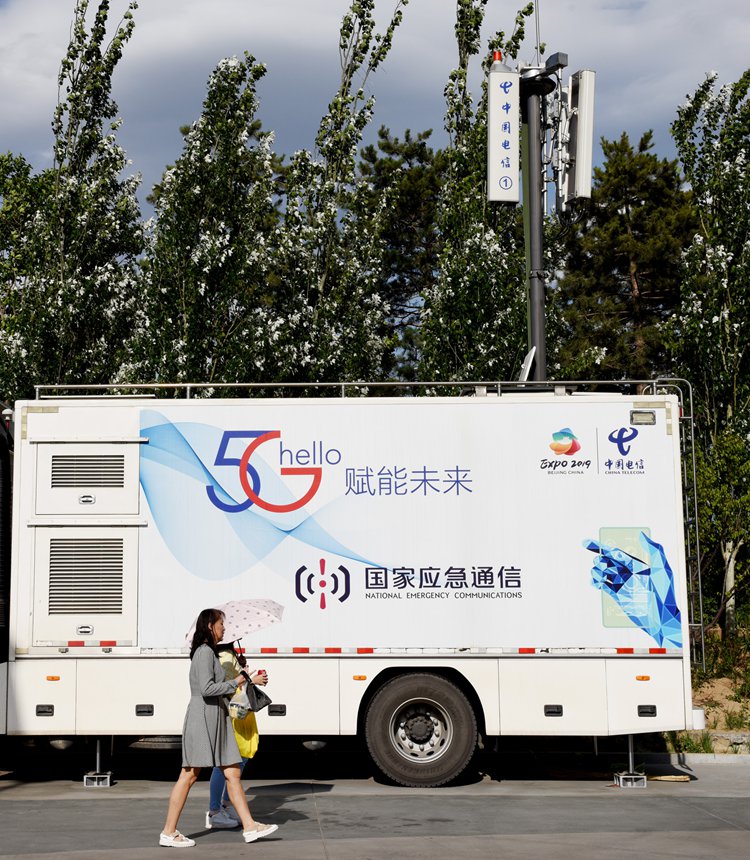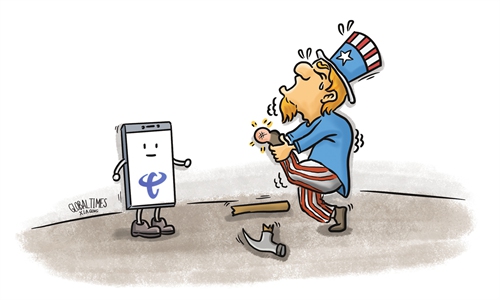
File photo: A visitor tours a 5G test space operated by China Telecom in suburban Beijing. Photo: VCG
Chinese officials have urged the US government to treat Chinese telecom companies in a "fair, non-discriminatory" manner, saying that China will take necessary measures to protect its firms' rights in the US after the latter revoked the authorization of China Telecom's US unit.Following a series of sanctions on a long list of Chinese companies, the US Federal Communications Commission (FCC)'s move to essentially bar China telecom from operating in the US adds to growing tension between the world's two biggest economies, experts noted.
"We urge the US to withdraw its decision to revoke China Telecom's Section 214 authority... stop its wrong action of politicizing economic issues and provide a fair, non-discriminatory environment for Chinese companies to invest and operate in the US," read a statement issued by the Ministry of Industry and Information Technology (MIIT) on Wednesday.
According to the MIIT, the US has repeatedly imposed sanctions on Chinese companies in recent years, using the excuse of national security regardless of the facts. The move may seriously damage international trade rules, and China will take necessary measures to safeguard the legitimate rights and interests of Chinese firms.
"The US has revoked the company (China Telecom)'s authority (to operate in the US) purely based on its doubts and subjective speculation, which will not only tarnish the US' global image as a market-oriented country, but also damage the rights of global consumers, including US clients," the MIIT noted.
The statement was issued after the FCC recently voted to order China Telecom Americas (CTA), China Telecom's US unit, to stop providing telecommunication services in the US. It made the decision on the alleged grounds that China Telecom is subject to influence by the Chinese government.
The measure also came amid the US' repeated crackdown on China's telecom industries, including ordering Chinese major telecom firms to delist from US capital markets and excluding Huawei from the US' telecom infrastructure, including 5G undersea cables.
Independent tech analyst Fu Liang noted that since the Trump era, the US has taken steps to crack down on Chinese telecom firms, and such steps are hurting companies on both sides.
"The US is creating an increasingly wider digital divide between China and the US, as well as restricting information communication between the two countries. This will also raise difficulties for many US multinational companies that have businesses in China," Fu told the Global Times.
Once the US creates an environment where Chinese telecom giants are facing increasing hostility in US markets, it also puts its own companies at risk of facing similar countermeasures from China at some point in the future, Fu said.
The analyst added that the US is also trying to curb Chinese telecom firms amid the latter's rising share in global markets in recent years, which the US considers a threat to its dominant role in the internet and telecom sectors. However, it's inevitable that the internet industry will move from a "US-centralized" or mono-centric pattern, whatever the US does to companies from other countries, Fu said.
Ma Jihua, a veteran industry analyst, also told the Global Times that the US' crackdown on China Telecom might be used as a bargaining chip in its future negotiations with China.
"The US is testing China's bottom line with such crackdowns. But China will never follow in the US' path, and instead will insist on globalization and opening-up," Ma said.
He also noted that the US' termination of CTA's operating license wouldn't have too much impact on China Telecom's business, as the latter's operations in the US are limited.
China Telecom earlier noted that the FCC's decision lacks reasonable grounds, and it has hurt CTA's legitimate rights and interests, according to a statement it sent to the Global Times.
The statement said that the company will remain in contact with its US subsidiary and assess the impact of the US government's decision on its business operations.




